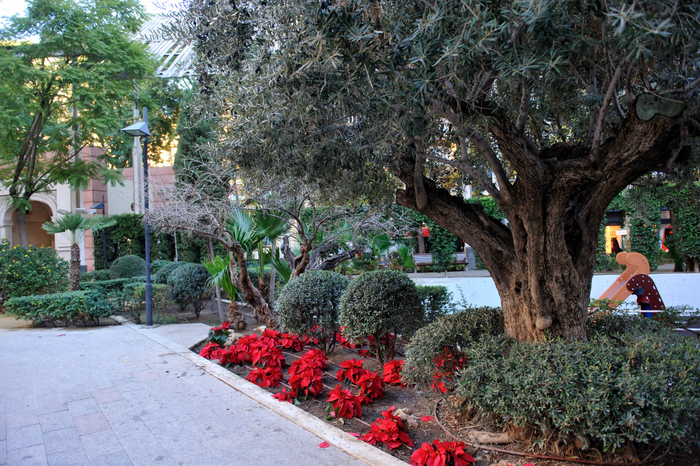Imaginative pruning of olive trees in Murcia City
Olive trees really are a Mediterranean gardener’s best friend
Looking for new ideas is an endless process when attempting to build a garden in an unfamiliar climate, and after several years of fighting the elements the most practical approach is often to just do what the locals do.

This novel way of pruning an olive tree in Murcia can be seen in the Plaza de Santa Isabel in the centre of Murcia City, as not only have the gardeners pruned the upper section of the tree tightly to control its sculptural form, they’ve also created a mini hedge around the base of the tree by pruning the relentless offshoots which always sprout around the base of established olives ( this example is probably a good 80 years plus) to form a second layer. Its common to see tightly pruned olives giving sculptural form in a garden, but this is the first time the hedge effect at the bottom has been noted.
It’s an unusual treatment of an olive but works and looked really effective alongside the other sculptural plants in the same garden.
Olives really are a gardener’s best friend in so many ways as they resist heat, wind, and lack of rain with good grace, and are evergreen,as well as lending themselves well to hard pruning and sculptural structure.
Although there is leaf loss they maintain an attractive blue-green hue throughout the year and if cut back hard can be prevented from shedding olives which make a real mess on paving below, particularly if trodden on, and can be dangerous on paved surfaces due to their hard central stones and squishy flesh which increase the risk of accidents. Regular pruning can also help to keep areas around the trees cleaner by minimising leaf loss.
Olive pollen is one of the main enemies of allergy sufferers, as although the flowers are barely distinguishable, have a potent pollen which can be a real nuisance for those suffering from hay-fever or pollen allergies.
However, they can be cut back really hard and sculpted, or allowed to bush into more substantial structures, and as they put on good new growth even if cut back brutally to mere stumps, can be transported easily and transplanted into new locations.
They’re also relatively cheap if you shop around and buy from a nursery which specialises in olives or has a good source: the Ed recently purchased some excellent specimens with good thick trunks for 25 euros, although the century old trees can fetch hundreds. However, the chances of killing an olive are lower than many other ornamental plants, so for their longevity and hardiness alone, they’re always a good investment.
For garden designers and suppliers, see the Murcia Today business directory
Ref olive allergies: Additional info sent by Leo Ogren:
If olive trees are pruned hard each year, the branches that have been pruned will not produce any allergenic pollen that year.
Of all the many types of pollen, olive is perhaps the very most allergenic and besides allergies, it often triggers asthma as well.
Reference: The Allergy-Fighting Garden: Stop Asthma and Allergies with Smart Landscaping
by Thomas Leo Ogren – Booksales randomhouse.com.au













































